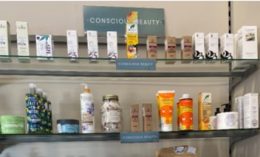From the catwalks to our wardrobes, nearly every one of us has a desire to be wearing what’s “in” right now, and it’s even better when these garments are a fraction of the price whilst still looking high-end. Fast fashion has grown exponentially in recent years, and our love for cheap clothes has had a massive cost on the environment.
Along with this, the cosmetics market has experienced major hype. According to Statista, the UK is among the leading three cosmetics consumers in Western Europe. In 2017 alone, this sector’s market value reached a staggering £9.8 billion.
Whilst it is only right that many people are concerned about the effects of fast fashion on the planet, and the waste produced from cosmetics products, the common narrative which we see is that it is us, the consumers, who are blamed for being the catalytic effects of this pandemic. When it is in fact the brands and their producers who should be held to account the most, as they orchestrate the entire operation where as we simply have a smaller part in it. That isn’t to say that we are completely innocent because we aren’t.
For the average person, it is unfortunately unrealistic to believe that every single high fashion garment is obtainable as they are far too much of an expensive upkeep, or that everyone can afford that new La Mer cream.
We’d all love something fresh off the latest Louis Vuitton catwalk, or what Kylie Jenner was seen applying to her face last week on her latest Instagram post, but for the vast majority of us we simply just can’t afford it.
Fast fashion has massively added to the waste problem, and it is currently amounting to around 10,000 items of clothing being sent to landfill every five minutes, says Keep Britain Tidy.
Moreover, Statista says that in the US alone in 2018, almost 7.9 billion units of plastic which was created for cosmetics products was thrown away.

Lucy Cousins, an Ecology student at the University of Lincoln, said that fast fashion makes up around 10% of the world’s entire landfill, with only 1% of clothing being reused.
“I think it’s good that people are moving in the right direction when it comes to being sustainable, and I think the environment is beginning to benefit from it, but I think there’s a lot more that people can do.”
“People can check the labels on clothing to see what materials they’re made out of and if they’re biodegradable, and on cosmetics products people should be checking their packaging too, but not just if they’re recyclable, they should also see what ingredients they contain, and if they’re cruelty-free.”
“It’s also very tempting now for people to buy things quickly through services such as Amazon Prime, however, they don’t recognise their own carbon footprints when doing this. It’s much better to physically go out and buy something.”
Gen Z in particular feel the strain of having to remain on-trend, as they buy a huge amount of fast fashion produce. The Guardian have said that 64% of British 16 to 19 year-olds have bought clothes they have admittedly never even worn, but ironically at the same time however, Mintel data shows that around 70% of this age group agree that sustainability is an important factor when it comes to buying clothes.
Similarly, Gen Z are one of the largest demographics when it comes to purchasing cosmetics, with 18 to 29 year olds dominating this trend. However, for this age group again, 70% of them stated they preferred natural and organic products, says Statista.
The rise of online secondhand resellers such as Depop and Vinted allow you to give your beloved clothes another life, without sending them to the landfill. You can also shop pieces from previous owners, especially retro and vintage items, for a fraction of the price. Some of the items on there aren’t even sold in the mainstream market anymore, so if you want to be the owner of some limited edition secondhand designer pieces, these sites will be your new best friend.
Rock Retro, located on the Guildhall Street in Lincoln, opened in 2019 and sells vintage and niche retro clothing pieces, shoes and accessories. This shop is just one of many across the country selling secondhand items.

Moreover, upstairs, they have a family-run zero waste shop called ‘Forage & Fill which sells beauty products, household items and even refill foods.
Emma Haigh, Volunteering Assistant at the University of Lincoln Students’ Union, has said that students in particular can be more sustainable through how they treat packaging, such as through shopping at places like Forage & Fill.
“Buy from sustainable shops, so we have loads in Lincoln, including the Eco Pantry and Forage and Fill, who have refillable products so you can go and refill your pasta instead of going and buying new kinds of plastic containers.”
As fashion and beauty trends take over the globe, many brands out there are waking up to the reality that what they are contributing to will eventually lead to a massive carbon footprint, one which may not be able to be reversed, as they begin to pave the way to a cleaner industry. But we the consumers also have a massive part to play in this too, as we have the options to make better decisions about where we buy from and what we do with our waste.











